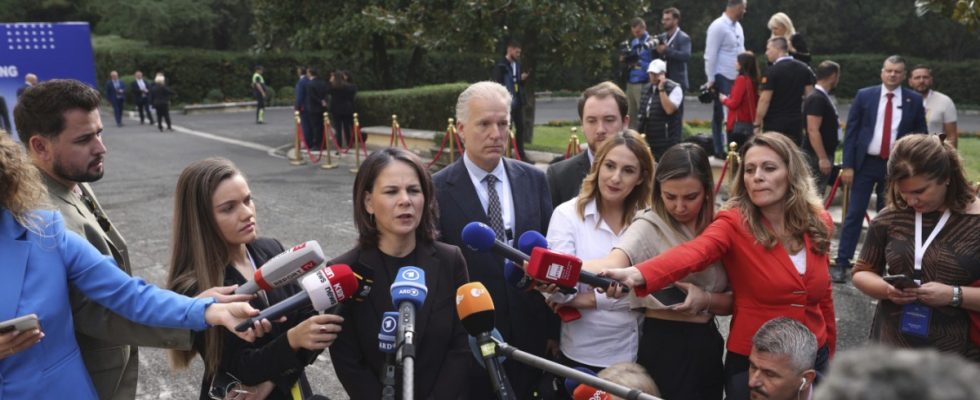The Albanian Foreign Ministry’s minutes had tried to maintain at least the appearance of a harmonious meeting between the Western Balkan states, Germany and the EU. Employees stuck small yellow Post-it notes on the light stone steps in front of Tirana’s pastel yellow Brigade Palace. Serbian Foreign Minister Ivica Dačić should have stood on the far left, a few meters next to his colleague from Kosovo, Donika Gërvalla-Schwarz. The flags were set up a little further in front of the facade – including the blue flag of Kosovo with the yellow outline of the state, which Serbia does not recognize and considers a breakaway province.
In Berlin last year, Belgrade’s representative had no problem being photographed with representatives of all five other Western Balkan states. As part of the Berlin Process initiated by the federal government in 2014, they agreed to more cooperation among themselves, which should also bring them closer to the European Union. This time Dačić stayed away from the family photo, both on the stairs and in front of the flags. It is a symbol of the tensions in the region.
Things escalated after Serb irregulars lured a Kosovar police unit into an ambush in northern Kosovo, which is predominantly inhabited by Serbs, at the end of September. One police officer died and three of the attackers were also killed. Belgrade then increased its troop presence in the five-kilometer-wide security strip on its side of the border so massively that the USA was forced to publicly warn against it and demand a withdrawal, as did the EU and the federal government shortly afterwards.
Pressure in separate conversations
Unfortunately, we had to experience a relapse on “security issues where we actually hoped and believed that we were a good deal further along,” said Federal Foreign Minister Annalena Baerbock. But there can only be a path to the European Union together, warned the Green politician, “it can only exist with respect for territorial integrity, it can only exist if you understand that security is always reciprocal.” She tried to make this clear again to Dačić and Gërvalla-Schwarz in separate conversations – whether it was successful remains to be seen.
The German delegation said that Baerbock had an “intensive and open exchange” with Dačić about ways to reduce tensions after the recent escalation of violence, which was also directed against soldiers from the NATO-led KFOR protection force in May. Baerbock demanded “full Serbian cooperation in investigating” the attacks and made it clear that a clear positioning of the Serbian government against violence and for peaceful understanding was a key to the EU accession process.
The question of whether Serbian President Aleksandar Vučić is prepared to take action against the leader of the attack on the Kosovo police, Milan Radoičić, is seen by the federal government as a litmus test as to whether he is seriously interested in the further process of EU accession – or at least that is what ringleader Radoičić is used to he close connections. He was temporarily arrested in Serbia, but was released again.
Verbal attack on the murdered father
On the way to the European family, there is “no way around living in peace and friendship with your neighbors and not always setting off things from the past against each other,” warned Baerbock after the plenary talks with her colleagues. On the one hand, this applied to Dačić, who in his speech accused the Kosovars of supporting terrorism and went far back into the past. He mentioned Gërvalla’s father, Jusuf Gërvalla, a Kosovar Albanian activist and supporter of the independence movement who was murdered by the Yugoslav secret service while in exile in Germany in 1982.
Baerbock’s warning also applied a little to the Kosovo side. In Tirana, Foreign Minister Gërvalla-Schwarz repeated the call for sanctions against Serbia and called for a clear condemnation of the attacks. Berlin and Brussels also expect a willingness to compromise from the Kosovo government of Prime Minister Albin Kurti. The talks on normalization brokered by the EU must continue and the Kosovo side, for example, should make progress in setting up a Serbian community association in the north.
Baerbock viewed the fact that Serbia had reduced its troops in the border area as positive. This shows that the talks with Belgrade made sense. At the same time, however, the federal government announced that it would send additional Bundeswehr soldiers to reinforce the KFOR troops. A spokesman for the Federal Ministry of Defense said the decision had nothing to do with the current tensions. With the stationing of 155 additional soldiers from April 2024, the Bundeswehr is only compensating for the withdrawal of an Austrian company. This is not an increase in KFOR troops. The decision was made in coordination with the partner states. However, Great Britain and Romania want to strengthen their troops. However, according to the Federal Government, Germany is demonstrating with this decision that it is living up to its responsibilities in the Balkans.
In ten days, Chancellor Olaf Scholz is expected to attend the Berlin Process summit in Albania. Then, the Federal Government and the European Commission hope, the actual issues will come back to the fore: the mutual recognition of school and professional qualifications and other things that bring concrete benefits to people. Baerbock also held out the prospect of rapprochement with the EU’s internal market, provided regional cooperation is further expanded. That’s what the young generation is waiting for, Baerbock told her colleagues. Thousands of them leave their homeland every year – mostly to seek their fortune in EU countries.

